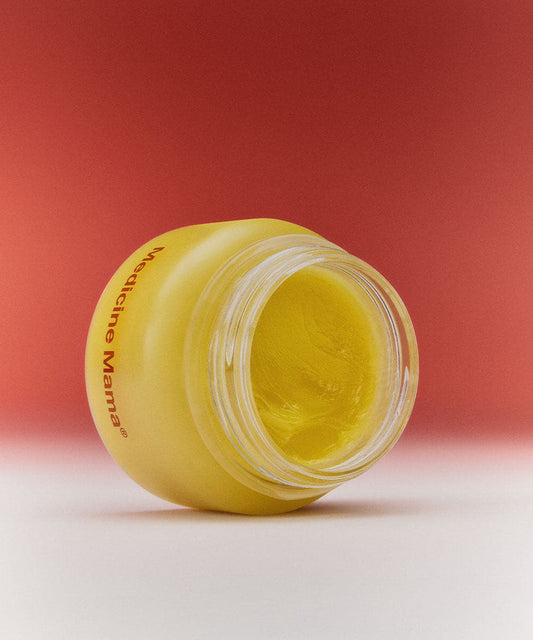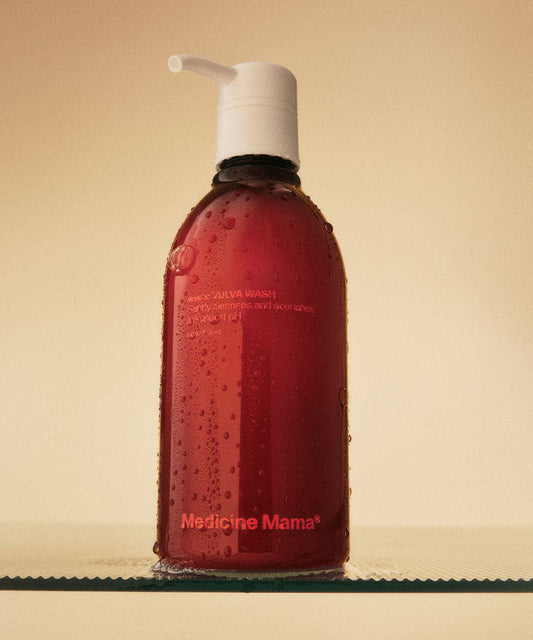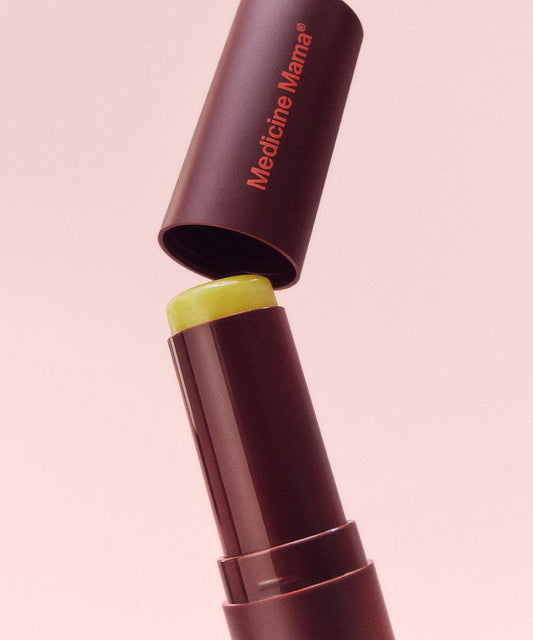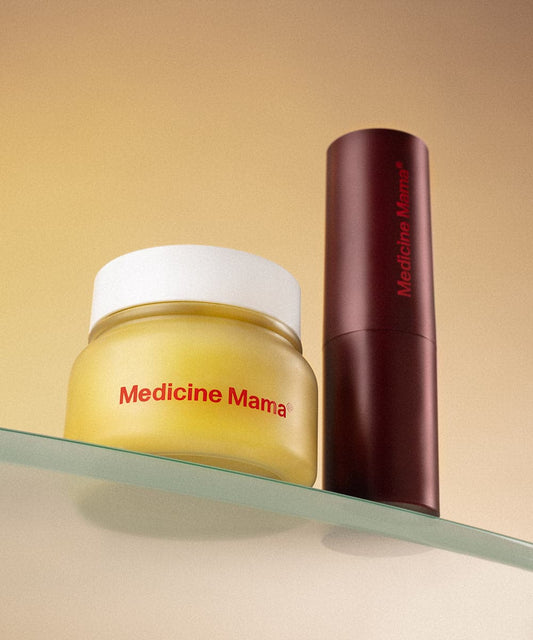
Reviewed by | Melinda (Melle) Hany, RN, ADN Registered Nurse
Menopause can feel like a surprise pop quiz on your body’s biology. One day, everything’s fine, and the next, you’re suddenly Googling why your vulva feels dry and irritated. If that sounds familiar, you’re not alone. Vaginal dryness is one of the most common menopause symptoms, but it’s also one of the least talked about.
At Medicine Mama, we believe that understanding your vaginal health shouldn’t feel awkward or overwhelming. You deserve clear answers and real solutions, not vague advice wrapped in flowery language.
So, if you’re tired of tiptoeing around this topic, let’s break it down. We’ll cover what’s really going on and, more importantly, how to find some much-needed relief.
What Exactly Is Menopause?
Menopause is basically your body’s way of announcing it’s ready for a new chapter. It’s the natural, biological shift when your ovaries stop releasing eggs and your estrogen levels drop. For most women, this transition happens between 45 and 55, but it can start earlier or later for some.
It’s not just a single moment, though. It actually happens in stages:
-
Perimenopause: The warm-up phase. This can start in your 40s (or earlier) and usually lasts a few years. You’ll still have periods, but they might be less predictable, and you might start noticing symptoms like hot flashes, night sweats, and vaginal dryness.
-
Menopause: Technically, this is just one day — the 12-month mark since your last period. After that, you’re officially in menopause.
-
Postmenopause: This is the stage where you’ll spend the rest of your life. Your body has adjusted to lower estrogen levels, but some symptoms can stick around or even pop up for the first time.
Not sure if you’ve officially reached menopause? Your doctor can help you figure that out. They can run tests, rule out other possible causes for your symptoms, and make sure everything’s on track. “However, you are officially considered menopausal if you naturally haven’t had your period for one year (without the aid of hormonal birth control methods),” highlights Melinda Hany, Registered Nurse.
So, What Is Vaginal Dryness?
We talked about menopause and how it can throw a few curveballs at your body, but what exactly is vaginal dryness? Simply put, it’s when the skin around your vulva and the lining of your vagina lose the natural moisture they used to have. This can make the tissue thinner, less elastic, and more sensitive, leading to a range of uncomfortable symptoms.
For some, it feels like a dry, tight sensation that shows up during sex or exercise. Others notice itching, burning, or even a raw feeling when they’re just going about their day. You might find that things like sitting for long periods, wearing tight clothes, or even using certain soaps suddenly feel irritating or even cause vaginal spotting.
It’s not just the physical discomfort, either. Vaginal dryness can mess with your confidence and even your relationships. It can make sex less enjoyable, workouts more irritating, and certain clothes suddenly feel off-limits. For some women, it can even lead to more frequent UTIs or minor tears that take forever to heal.
And while it’s easy to brush off these changes or tell yourself it’s just part of getting older, it’s worth paying attention to how you’re feeling. You deserve to feel good in your body, and a little dryness shouldn’t stand in the way of that. “Menopause isn’t the end of something. It’s the start of the rest of your life,” Hany adds.
Why Does Vaginal Dryness Happen During Menopause?
We get it — you’re already dealing with hot flashes, night sweats, and unpredictable mood swings, and now your vulva’s feeling like it skipped its moisturizer. So, what’s going on?
The short answer is hormones. Specifically, the drop in estrogen that comes with menopause. Estrogen plays a big role in keeping your vaginal tissue thick, stretchy, and naturally lubricated. When those levels dip, the tissue becomes thinner, less elastic, and drier. This change can also lower your natural pH balance, making you more prone to irritation and infection.
But it’s not just the hormones. Other factors can add to the dryness, like stress, certain medications, smoking, and even some personal care products. Things like harsh soaps, scented laundry detergents, or even tight, non-breathable clothing can make things worse.
How Can You Find Relief from Vaginal Dryness?
Wondering how to bring a little comfort back to your daily routine? Good news: there are lots of ways to find relief.
Here are some of the most effective options:
Moisturize Like You Mean It
Your vulva’s skin is delicate and needs the right kind of moisture to stay comfortable. That’s where VMAGIC® Vulva Balm comes in. It’s packed with organic, hormone-free ingredients like extra virgin olive oil, avocado oil, and sea buckthorn oil, plus a blend of honey and propolis to support your skin without any of the irritating stuff you’ll find in typical body lotions.
To use, just scoop out a small amount with clean, dry fingers and massage it into your vulvar skin, including the inner and outer labia, clitoris, vaginal opening, or mons pubis. It’s gentle enough for daily use, whether you’re looking for all-day comfort or just a little extra moisture when things feel off. What’s not to love?
Stay Hydrated
This sounds like the kind of generic advice you’d get from a fitness influencer, but hear us out — staying hydrated really does make a difference when it comes to vaginal dryness. When you’re not drinking enough H2O, your body has to prioritize where the moisture goes, and unfortunately, your vulva is not at the top of the list.
Dehydration can also lead to thicker, less slippery mucus, which isn’t exactly what you want when you’re trying to stay comfortable. To keep dehydration at bay — and your vulva from feeling like the Sahara — aim for at least eight cups a day.
If plain water gets boring, mix it up with herbal teas, fruit-infused water, or foods that are naturally hydrating (think: watermelon, cucumber, and celery). You’ll be surprised at how much better your whole body feels when you’re properly hydrated.
Switch to Vulva-Safe Cleansers
If your current wash leaves you feeling tight, itchy, or irritated, it’s not you, it’s the formula. Many everyday body washes are loaded with fragrance, dyes, and foaming agents that disrupt your skin’s natural moisture barrier. And since vulvar skin is especially sensitive, it can react to even "gentle" soaps if they’re not formulated for that area.
The fix? Swap your body wash for something designed specifically for vulvas. VMAGIC® Vulva Wash is a fragrance-free, pH-balanced cleanser that gently removes sweat and residue without stripping moisture. It rinses clean, doesn’t leave behind any sticky feeling, and supports your skin’s natural balance — all the things you want in a wash, and none of the things you don’t.
Aside from cleansing, it is important to moisturize both inside and outside the vagina. Vaginal dryness during menopause can put a damper on intimate experiences, but using a moisturizing and protective lube can help.
Intimate Glide hydrates and protects tissues to provide long-lasting moisture, so you can say goodbye to intimate dryness with hyaluronic acid and aloe.
The Bottom Line
So, what exactly causes vaginal dryness during menopause, and is it possible to find relief? In short, it’s usually the drop in estrogen that comes with menopause, but other factors can play a role.
Fortunately, there are plenty of ways to keep your vulva comfortable and healthy. From staying hydrated to choosing vulva-friendly cleansers and using high-quality moisturizers, small changes can make a big difference.
And remember, if you’re ever feeling confused or concerned about the changes your body is going through, it’s always a good idea to check in with your doctor. They can help rule out other possible causes and make sure you’re getting the care you need.
At Medicine Mama, we believe knowledge is power, and every woman deserves to feel comfortable and confident in her body. If you’re ready to give your vulva the love it deserves, we’ve got you covered with products that are boldly pure, clinically tested, and designed to support vulvar wellness at every stage.
Sources:
What Is Menopause? | National Institute on Aging
Vaginal Dryness: Causes, Symptoms & Treatment | Cleveland Clinic
Experiencing Vaginal Dryness? Here's What You Need to Know. | ACOG



